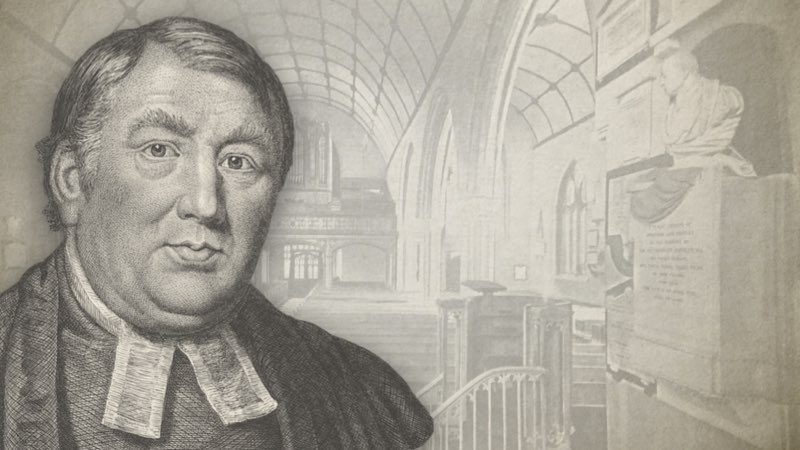
May 29—Morning Devotion
“As by the offence of one, judgment came upon all men to condemnation; even so, by the righteousness of one, the free gift came upon all men unto justification of life.”—Romans 5:18
Concerning the ruin in which thou art involved in Adam, surely, my soul, thou knowest and feelest it from day to day. No one can persuade thee out of this. Thou art as much concerned in. the sin, and consequently implicated in the punishment, of the first man’s transgression, as if thou hadst been, and which indeed as thy root and head thou really wert, in the garden with him when he did it. And thou feelest the same disposition to sin the same rebellion in thy very nature. So that most fully and freely dost thou subscribe to the rights of God’s judgment, that condemnation cometh upon all men, because all have sinned. Now then see, my soul, whether, through the same Almighty Teacher who convinced thee of sin, thou art convinced also of the righteousness of Jesus, and art as fully and as truly interested in all that belongs unto him. Now as Adam and his seed are one in sin and its just consequences, so equally Christ and his seed, in the eye of God’s law and justice, are one in Christ’s righteousness. Remember, my soul, and it is a great point to remember, Jesus is never spoken of in scripture as a single person, and as the Christ of God, but as the covenant head. He is as much the head, the root, the common stock of all his spiritual seed, as Adam was the head, and root, and stock, of all his natural seed. So then, as Adam’s sin is the sin of all his children, because they are his children; even so the righteousness of Christ, the second Adam so called, is the righteousness of all his children, because they are his children. This is so plain a truth, that it can need no further argument. The next point now is, in order to enjoy all the comfort and blessedness which ariseth out of this precious doctrine, that thou shouldest be able, my soul, to prove that thou art of Christ’s seed. Very fully thou provest from day to day, by the remains of indwelling corruption that ariseth within, that thou art of the stock of the first Adam: how wilt thou prove thy relationship to the second? For, as upon the presumption, I had not sprung from the stock of Adam, and none of his blood was running in my veins, I should not have partaken of his sin, or been subject to his punishment; so equally evident it is, that if I am not born again and belong to the seed of Christ, I am not interested in him or his righteousness. Blessed be God! the relationship with Jesus, as the glorious Head and Mediator of his people, is as easily to be proved as the relationship with Adam. God promised to pour out of his Spirit upon Christ’s seed, Isa. 44:3, 4, 5. Hast thou then, my soul, the Spirit of Christ as thou hast the nature of Adam? Is Jesus precious, more precious than gold—his salvation dear—his righteousness thy only confidence? Canst thou, and dost thou say, with one of old, “this is all my salvation, and all my desire?” Is he whom the Father delighteth in, thy delight —he that is the desire of all nations, thy desire? If these and the like testimonies are in thy experience, my soul, what greater evidences dost thou need, to manifest thy relationship to thy Jesus, as thy corruptions prove thee allied to the old nature? See then, my soul, that thou foldest up this soul- reviving truth for thy bosom, and carriest it about with thee daily wherever thou goest; so will Jesus be thy hope and thy portion for ever.
Robert Hawker (1753-1827) was an Anglican (High-Calvinist) preacher who served as Vicar of Charles Church, Plymouth. John Hazelton wrote of him:
“The prominent features…in Robert Hawker's testimony…was the Person of Christ….Dr. Hawker delighted to speak of his Lord as "My most glorious Christ.” What anxious heart but finds at times in the perusal of the doctor's writings a measure of relief, a softening, and a mellowing? an almost imperceptible yet secret and constraining power in leading out of self and off from the misery and bondage of the flesh into a contemplation of the Person and preciousness of Christ as "the chiefest among ten thousand and the altogether lovely." Christ and Him crucified was emphatically the burden of his song and the keynote of his ministry. He preached his last sermon in Charles Church on March 18th, 1827, and on April 6th he died, after being six years curate and forty-three years vicar of the parish. On the last day of his life he repeated a part of Ephesians 1, from the 6th to the 12th verses, and as he proceeded he enlarged on the verses, but dwelt more fully on these words: "To the praise of His glory Who first trusted in Christ." He paused and asked, "Who first trusted in Christ?" And then made this answer: "It was God the Father Who first trusted in Christ."
Robert Hawker on the Biblical Covenants (Complete)
Robert Hawker's Poor Man's Morning Portions




